I Am Mongolia - Lessons in Humility, Resilience, and the Wild Heart

I Am Mongolia - Lessons in Humility, Resilience, and the Wild Heart
I am the one who strips away your illusions about control
The journey began in Ulaanbaatar, Mongolia's capital, and if I'm honest, those first hours nearly broke my romantic notions about this adventure before it truly started.

I am the one who shows you that every transformation begins with discomfort
Ulaanbaatar feels like a city caught between worlds, struggling with its own identity crisis: Soviet-era buildings intertwined with the gleaming new shopping centres. The infrastructure can't keep pace with rapid development and an ever growing population (with 1.7 million inhabitants it represents 69% of the country population). The noise is relentless—construction, traffic, the sounds of a nation modernizing faster than its systems could handle.
I am the one who tells you that Left or Right are all the same
We were amazed by the number of right-hand drive cars (apparently all imported from Japan) that are sharing the roads with left-hand drive cars with no apparent difficulties: U-turns are improvised anywhere and anyhow, traffic lights rules make no sense at all! Pedestrians risk their life at every crossing. Chaos seems organised and everyone keeps on walking. So did we!
An amazing fact about Ulaanbaatar: it is the coldest city on earth, with temperatures reaching -40C in the winter. We will have to go back to experience this!
This harsh urban reality felt so far from the wilderness images that had drawn me here. But perhaps that jarring introduction was exactly what I needed - a stripping away of expectations before the real teachings could begin (I did not yet know this).
The Gobi Desert: Where Silence Becomes Teacher
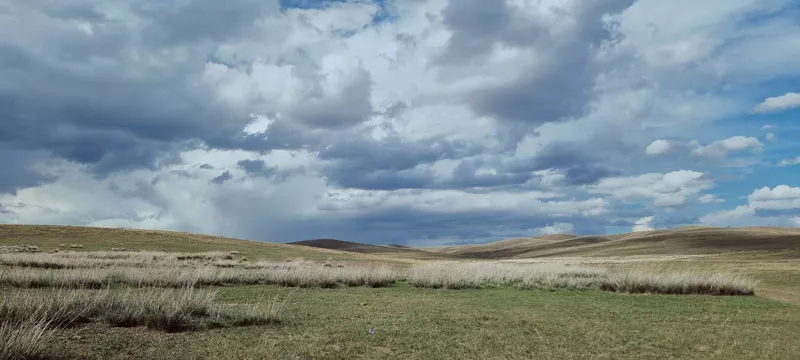
I am the one who shows you what emptiness actually contains.
From Ulaanbaatar's chaos, we drove south into the Gobi Desert, and the transformation was immediate. The urban noise gradually gave way to wind, then to something deeper—true silence….. No words can describe it.
Miles after miles of steppe, scattered shrubs, and sky so vast it seemed to curve at the edges. This wasn't the desert we are used to in the Middle East, but something rawer, more austere, more honest in its transparency and openness. You can't hide in such a landscape.
Our week in the Gobi stripped away layers I didn't know I was carrying. This type of landscape doesn't negotiate. It doesn't care about your comfort zone, your schedule, or your need for stimulation. It simply is - relentlessly, beautifully, overwhelmingly present.
We covered further landscape and slept at the base of Bayanzag Flaming Cliffs for the best morning sun rise or the White Stuppa.
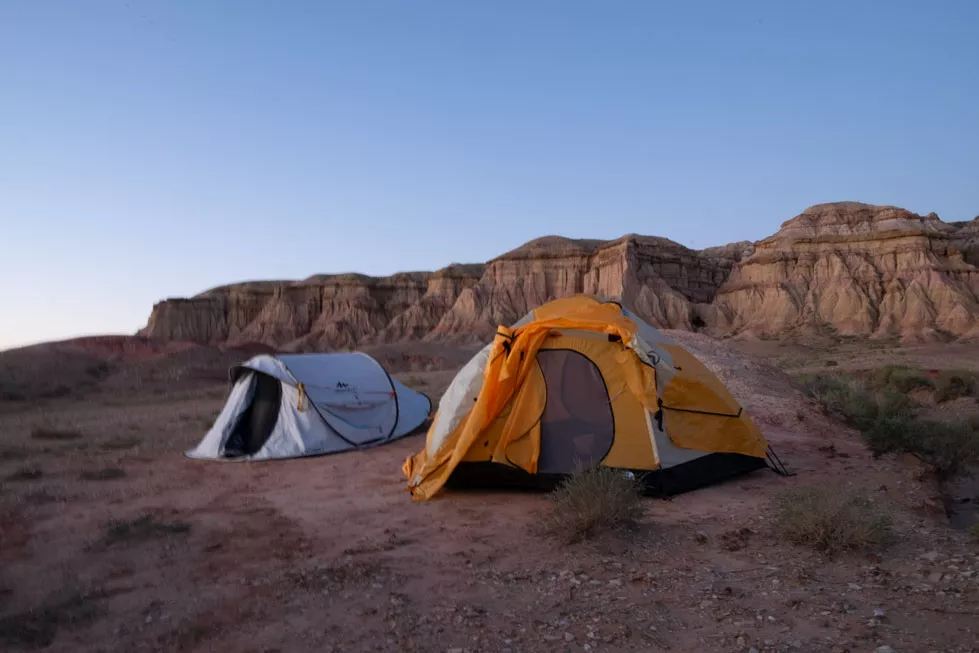
We tried to begin each day around dawn, wanting to witness the first rays of light. We would leave the comfort and warmth of our sleeping bags in the hope of capturing the images our souls were taking in but our cameras haven't truly captured.
At the base of Bayanzag Flaming Cliffs we emerged from our tents to be faced with a dozen of photographers standing on our doorway, also hoping to capture 'the perfect shot'. Just when we thought we were alone.
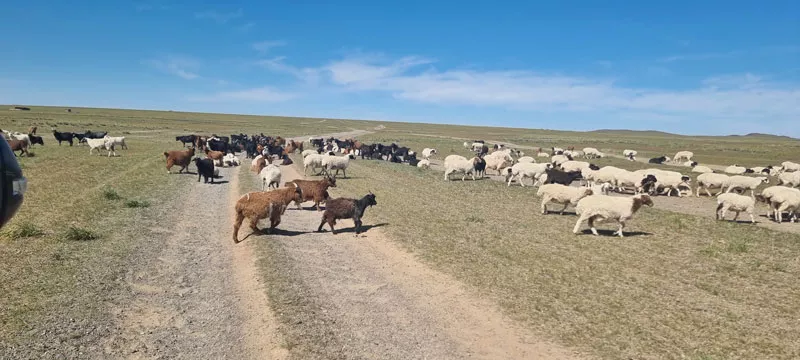
During the day we drove endless kilometers, navigating our way through the changing landscape, carefully avoiding herds of sheep, goats (think cashmere jumpers!), horses and Bactrian camels.
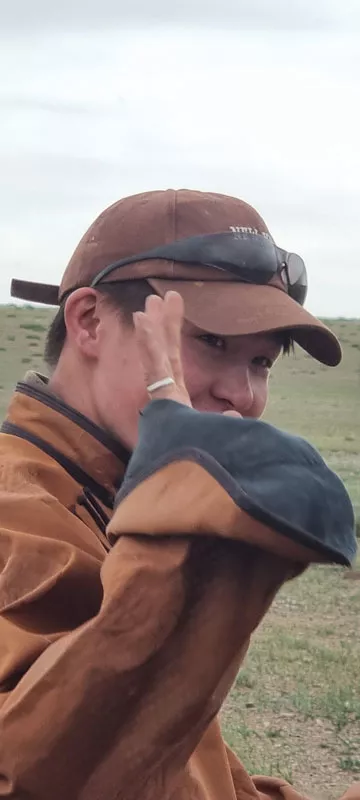
I'm the one who shows you the way, follow me!
Each night ended at dusk, scrambling about to put our tents up, a quick dinner and bed! The cold wind was rushing us into shelter. The Blood Full Moon was our loyal companion on those nights. Later on during the trip, the moon disappeared and we were blessed by the most beautiful star-lit sky. Such a reminder that we are all just temporary arrangements of stardust, briefly conscious, briefly able to love and lose and love again.
Carl Jung wrote that "your vision becomes clear when you look into your heart. Who looks outside, dreams. Who looks inside, awakens." The desert's gift was this kind of awakening—not comfortable, but necessary.
I am the one who holds space for all your feelings—even the uncomfortable ones—and reminds you that you're never truly alone in the wilderness.
The Golden Eagle Hunters: Courage Without Conquest
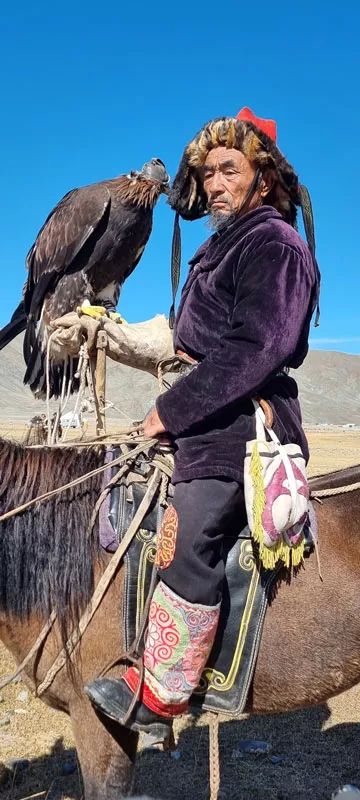
I am the one who shows you the difference between power and force, between partnership and domination
From the Gobi's teaching silence and wilderness, we travelled north to the Golden Eagle Festival in the Altai. 'This is it!' I said to myself 'this is one of my dreams. This is what brought me here!'
The festival is a celebration of an ancient partnership—hunters and eagles working together in a dance of mutual respect that has sustained nomadic peoples for generations. The hunters moved through the festival grounds with fluid grace, but it was their relationship with their golden eagles that truly captivated me.
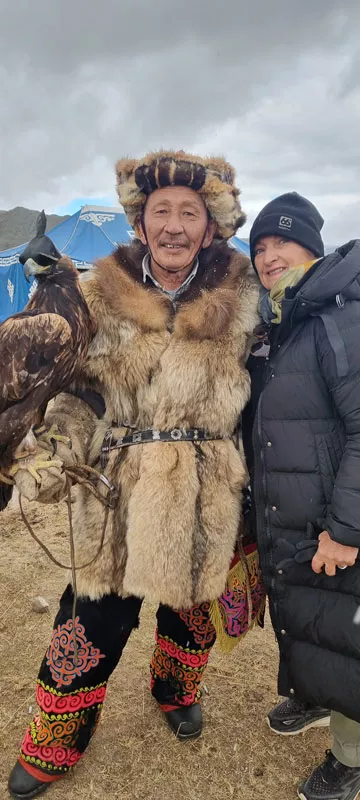
I'm the one who reminds you of Kazakhs History of Trauma and Resilience
It's good to remember here that Eagle Hunting is a long standing tradition of Kazakhs people. It was banned during the Soviet rule of the 1930s. The Kazakhs people who managed to escape the inflicted famine and imprisonment or exile migrated into the Western regions of Mongolia and China. The Eagle Hunting tradition once regarded as been bourgeois is very much alive today.
Against the backdrop of Kazakh Eagle Hunters displaying their skills, some stood out. Their weathered faces (only breaking in a smile when they looked at their photos on my camera),their straight backs on their horses as their hooded eagles patiently posed for the best shots. Handsome Kazakh men who display determination which reflects their people's past and resilience.
Once named the Brad Pitt of Mongolia, Jenisbek Tserik a multi-title champion wears his name proudly "steel warrior' and embodies something profound—the kind of mastery that comes not from domination but from deep listening, from years of learning to speak the language of partnership with one of nature's most magnificent predators.
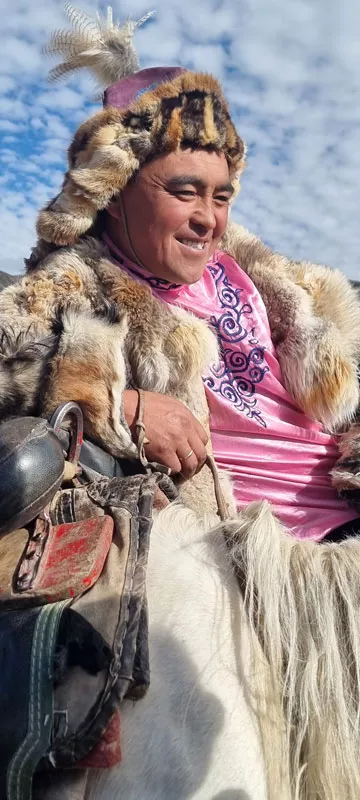
No coercion, no domination—just mutual respect and ancient understanding. Their dance is well choreographed. The hunter chooses to release. The eagle chooses to return.
As I was watching weathered hands gently adjusting the leather glove that had been shaped by years of partnership with these magnificent birds, I soon understood that 'you cannot force the eagle. You can only create conditions where the eagle wants to come back to you.'
My heart was full. I was witnessing the embodiment of a childhood dream I'd carried for decades— images of Eagle Hunters that had stirred something wild in my young heart. But standing there in the thin mountain air, I understood that dreams fulfilled in adulthood carry deeper medicine than childhood imagination could grasp.
Isn't this the essence of every healthy relationship? Creating conditions where the other chooses to return, chooses to stay, chooses to grow alongside you rather than being forced or manipulated into connection?
For couples struggling with control and trust, Mongolia offered a profound metaphor: What if love, Eagle Hunter was about creating safety and freedom simultaneously? What if the relationships that soar are the ones where both partners feel free to leave but choose to stay?
Sacred Peaks and Ancient Traditions: Journey to the Altai Mountains
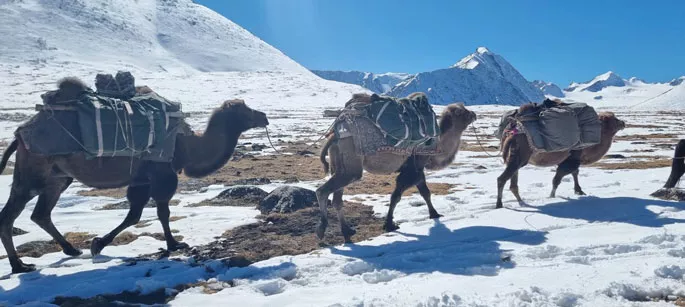
I am the one who teaches you that the most profound encounters require the most demanding journeys
The Festival is over and we are now ready for the last adventure of this trip: The Altai Tavan Bodg National Park on the most western parts of Mongolia bordering China and Russia.
Covering over 6300 square kilometres, the park includes aquamarine rivers and lakes that reminded me of Nepal. I Wish we had seen a Snow leopard! Next time!
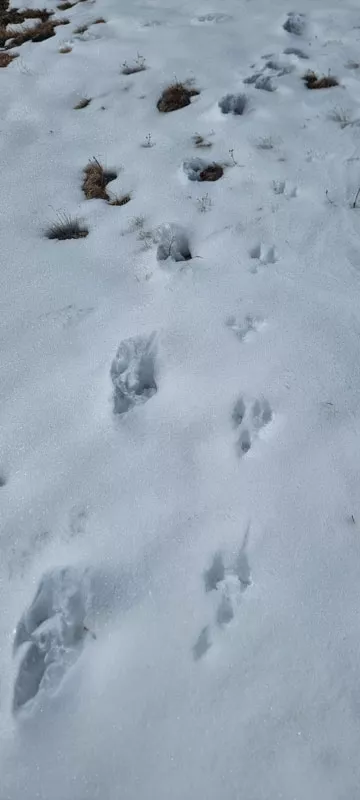
No Snow leopard, but wolf's print guided us on our journey as we were trekking towards Belukha (the highest peak towering at 14,783 ft) to stand closer to Potanin Glacier.
Belukha, the sacred mountain revered by indigenous peoples for millennia, holds a presence that demands something of you before it reveals its gifts. Each step of our 20 km trek stripped away another layer of comfort, another illusion of ease. The thin mountain air forced me to slow down, to breathe more consciously, to rest when my body demanded it rather than rushing to a schedule. My travel companions and I moved like a small caravan, at different paces, sometimes together sometimes alone. Moments of doubt emerged: I wished we were on horses!
When we finally stood before the glacier, facing Belukha's snow-crowned summit, the silence was absolute. This wasn't the kind of quiet you experience in cities—this was the silence of geological time, of ice formed over millennia, of peaks that indigenous shamans and Buddhist pilgrims have considered a gateway to the divine. The glacier's blue-white face seemed to pulse with its own ancient heartbeat, and I understood viscerally why Belukha is sacred.
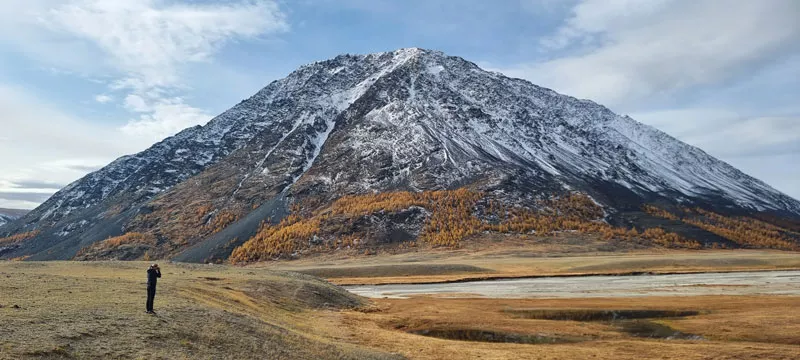
I am the one who shows you that places hold power that can only be felt, never explained
Mongolia offered us another sacred encounter—Shiveet Khairkhan Mountain, a peak that locals consider one of the most spiritually significant in the region.
Unlike the demanding physical challenge of reaching Belukha, Shiveet Khairkhan drew us in with a different kind of magnetism. This mountain, whose name translates roughly to "Sacred Holy Mountain," is wrapped in shamanic traditions and ancient reverence that you can feel in the air itself.
Standing in the presence of Shiveet Khairkhan, our guide shared stories of how shamans have travelled here for centuries to perform rituals and seek visions. The mountain is considered a dwelling place of powerful spirits, a place where the veil between worlds grows thin. Whether you hold such beliefs or approach them as cultural anthropology, there's something undeniably moving about witnessing a landscape that has been held sacred for so long that its reverence feels woven into the very stones.
The Tuva Nomads: Masters of Presence
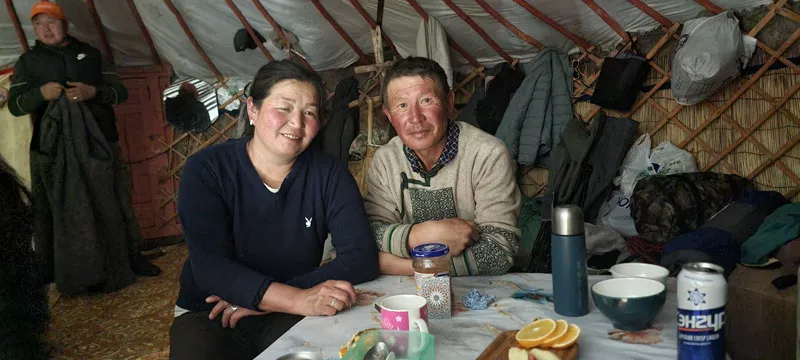
I am the one who teaches you that home isn't a place—it's a way of being present to what is
Our final and most profound encounter (for me at least) brought us to a Tuva nomad family, and it was here that the deepest teachings unfolded. Living with Bayaraa and his wife Chimegee for a couple of days, I watched people who've mastered something we in the modern world struggle with: being fully present to the moment they're in.
No rushing towards tomorrow, no clinging to yesterday. Just the immediacy of now—milking yaks at dawn, preparing tea, tending to the fire, sharing food.
None of this connection would have been possible without our guide—Byambaa Byambadorj a remarkable woman who served as a fun, kind and sensitive connection between the nomadic world and our Western ways of understanding. Her endless patience with our questions, her ability to translate not just language but entire worldviews, made her more than a guide—she became a cultural interpreter, a teacher, a gentle gateway into a way of life we could otherwise only observe from the outside.
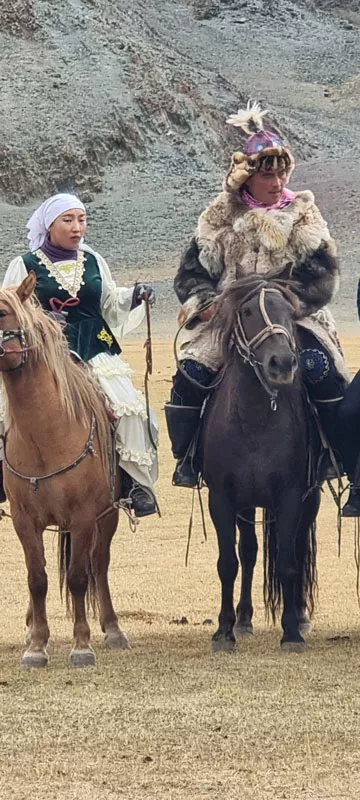
Byambaa fed us information like she fed us meals—generously, continuously, with genuine care for our nourishment. Through her stories, I learned about our hosts, their way of life, their eminent journey to their winter camp as snow was on its way.
She also spoke of the reindeer nomads in the North, a people even more remote, even more connected to the ancient rhythms of the land. Her descriptions of their migrations, their relationship with their reindeer herds, their incredible resilience in Mongolia's harshest regions, planted seeds of longing that continue to grow in my heart.
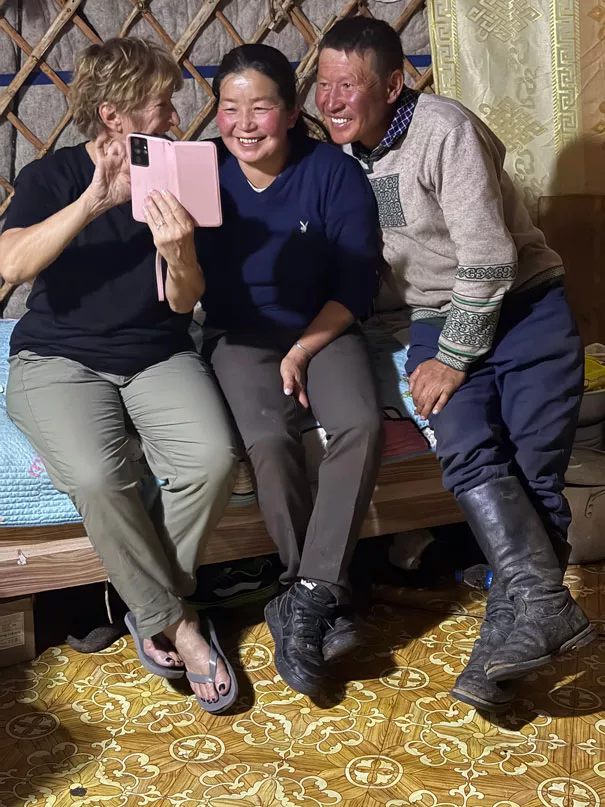
I am the one who plants dreams that demand courage to fulfil
On the second night, our hosts offered us their traditional Mongolian vodka they'd distilled themselves. Nermel tastes was unlike anything I'd experienced: earthy, slightly sour, with the bite of fermentation and the warmth of alcohol. It wasn't about the drinking—it was about the ritual, the sharing, the way this ancient process connected them to their herds and to generations of nomads who had perfected this alchemy of survival. A drink they share for special occasions, was offered in our honour, in the honour of my husband's birthday.
When Plans Crumble: The Gift of Surrendering Control
I am the one who teaches you that the best adventures rarely go according to plan.
It did not all go according to plans and the fear of having my dream robbed off me led me to take the risk of a 'deep' conversation with the organiser. I spoke about my dreams and reasons to visit his beautiful country. I spoke about the meaning this held for me, the disappointment I felt as plans were not being respected.
My words fell flat! like heavy stones crashing on the ground. I am not sure how they affected him, as his expressionless face gave me no cue on his thoughts nor feelings.
I felt a deep surge of rejection and belittling that woke up my own personal trauma. My body shuddered with the familiar pain of despair. I was very upset and also grateful for the work I do, as I managed to 'keep it all together'. I did not let the 'little me' run wildly. I spoke of my own feelings: no judgement, no blames, just pure vulnerability. I took the risk to open and expose my heart: Ouch that hurt! How hard it is for some people to hold that soft space for the heart to feel safe.
Another big learning on that day: I understood why 'keeping quiet' can be so much safer. I could never do that as a child and I often got into big trouble for wanting to be heard, for wanting someone to show me accountability, and responsibility.
There is still plenty to learn: How to handle one's expectations - What's too little v what's too much?
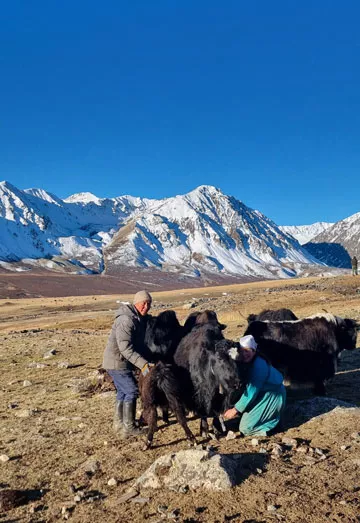
I am the one who shows you that some losses reveal what truly matters
What we found out as we arrived at our host's ger is that the organizational failures had cost more than just schedule delays—they had disrupted the rhythm of life we came to witness. Our host Chimegee especially had had to rush about preparing for our arrival. The milking of the yaks was neglected, the moment for the star blessing did not take place: there was no milk. There was a particular sadness in missing these ancient rituals, not because of weather or natural circumstances, but because of human inefficiency and broken promises.
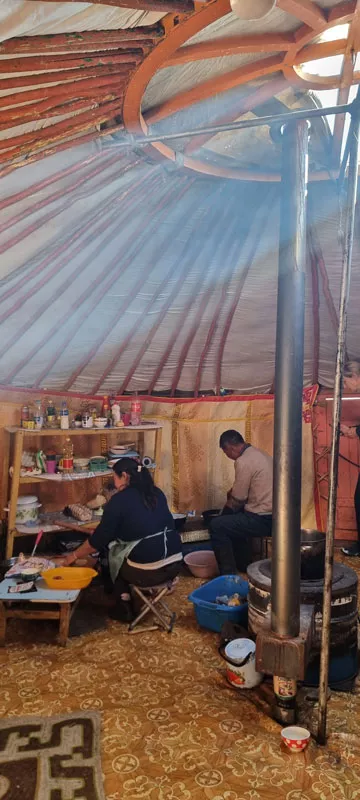
Yet watching how gracefully Bayaraa and Chimegee worked around the situation, accepting this disruption taught me something profound. They didn't rage against the missed schedule or lecture us about the importance of timing in nomadic life. They simply adjusted, offering us tea and soup even though they looked tired and concerned for the milk they had lost as the calves had drunk the uncollected milk. Yak milk is used for clotted cream, butter, cheese and is a main ingredient in their cooking. It will have taken them a few days to recover their life rhythm.
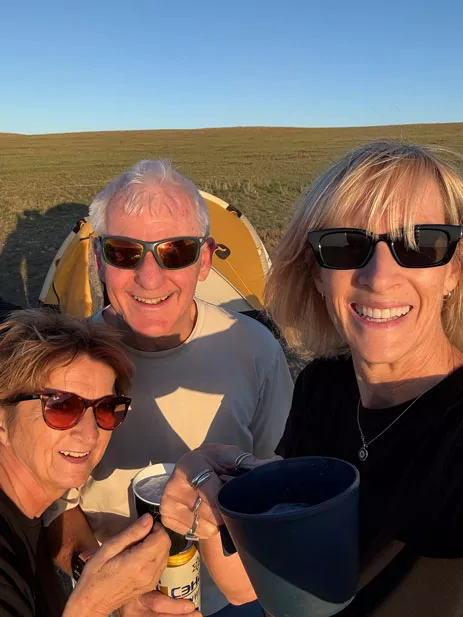
I am the one who shows you that vulnerability shared creates stronger bonds than perfection performed
The mishappening of this leg of the trip brought closeness between our host, our guide and between us (our little group of 3).
Traveling with close friends transformed what could have been a disaster into something unexpectedly profound. When you're navigating disappointment with people you trust, you discover that connection matters more than perfection.
We become mirrors to each other, reflecting resilience when one of us forgot we had it, offering perspective when disappointment threatened to eclipse wonder.
Brené Brown writes about vulnerability as "the birthplace of courage, creativity, and change." The three of us discovered this truth firsthand—when we stopped trying to control our experience and started being present to what was actually happening, Mongolia revealed its gifts.
Bringing Mongolia Home: Integration and Daily Practice
I am the one who reminds you that transformation without integration is just tourism.
The real work began when I returned to Dubai. How do I carry the spaciousness of Mongolia into rush hour traffic? How do I remember the lesson of the Eagle Hunter when my husband and I are negotiating a situation? How do I hold onto the desert silence when life takes over?
Here's what I learned about integration:
Create micro-moments of Mongolia. Each morning, I have caught myself looking at the sky—really looking—remembering that vastness exists beyond my to-do list.
Practice the nomad's presence. When preparing a meal, I have tried to just prepare a meal (and not distracting myself with the news on the radio). I have paid more attention to listening, really listening. Mongolia taught me that multitasking is often a form of absence from our own lives.
Channel the Eagle Hunter's patience. In relationships, I ask myself: Am I trying to force something, or am I creating conditions for natural connection to emerge?
Honour the desert's truth-telling. When emotions arise—difficult ones—I try to meet them with the same spacious acceptance the desert showed me.
The Archetype Lives On
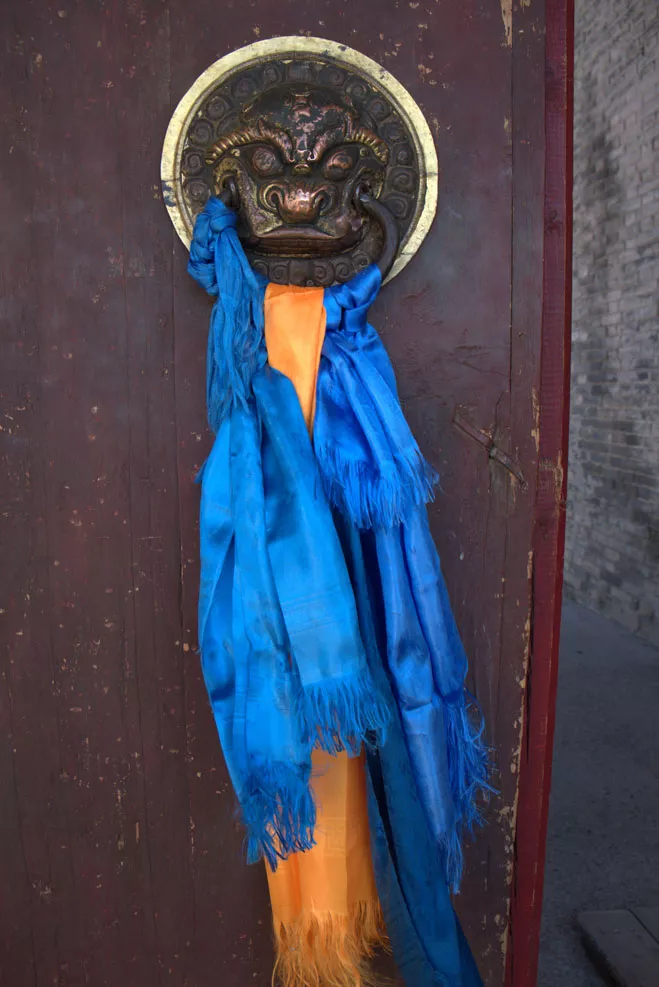
I am the one who doesn't let you forget what you're capable of
Mongolia became more than memory—it became an internal compass. When life feels overwhelming, I invoke Mongolia: the part of me that can survive without comfort, that can find beauty in barrenness, that can trust the process even when the destination isn't clear.
For those of you reading this who feel stuck in the comfortable prison of predictability, who feel your wild heart calling from beneath layers of responsibility and respectability—Mongolia asks: What would it look like to live more spaciously? What would it mean to trust the flow of your own seasons?
You don't need to travel to Mongolia to meet this Archetype. You need to find the places—internal and external—where your illusions of control dissolve, where your capacity for presence expands, where you remember that you're both infinitesimally small and cosmically significant.
Mongolia speaks: I am always here, in every moment you choose courage over comfort, presence over performance, trust over control. I am the wild heart that remembers what it means to be truly alive.
The images I am sharing are an invitations to remember who we are beneath whom we think we should be.
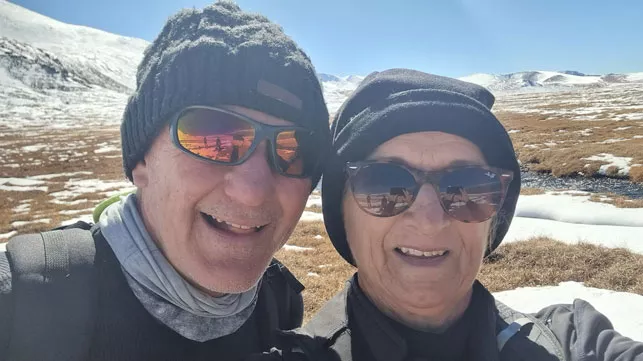
Mongolia - A Childhood Dream - October 2025
Never Miss a New Journal Entry
Join the newsletter to stay up to date on the latest from the blog and get answers on mental health and relationships.


.jpg)





